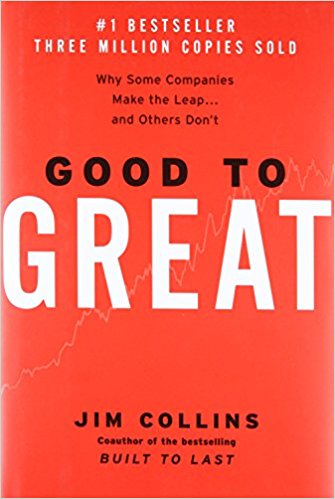It’s time. Business is good; customers are rolling in, the money is plentiful, and you can already hear the brands calling. But believe it or not, it’s the scaling phase where the majority of startups epically fail. In fact, the failure rate of U.S. companies after they pass the five year mark is over 50%. After 10 years? That percentage rises to over 70!
Want to avoid being part of that statistic? Knowing the issues you may face can be incredibly helpful.

Good to Great
by Jim Collins
⏱ 14 minutes reading time
🎧 Audio version available
Scaling Too Soon and Too Fast
As a founder, it’s your job and duty to your startup to remove all possible hurdles from your path so that your business can grow, unobstructed. We’re looking to scale smart, and that’s not necessarily synonymous with scaling fast.
Yes, there is actually a risk of scaling too rapidly. Actually, it’s one of the deadliest issues that entrepreneurs face when they’re scaling their startups.
There is nothing wrong with waiting, but some founders get impatient and launch their vision before they’ve worked out the bugs and issues. They believe the kinks are will fade, shake themselves out, or go away over time.
Then comes a similar mistake, and that’s scaling too fast. There’s a critical point when you can’t believe how many customers are calling, how much the public is consuming your product, and even how many brands and investors want to meet up with you. Now, those are signs of growth, but it’s a slippery slope.
CB Insights, a company that’s responsible for a business analytics platform and a global database that provides the world with intelligence on investor activities and private companies, agrees. They say the main cause of startups crashing and burning is that they can’t find product-market fit.
You could have the best data in the world, the best reputation, and world-changing technology, but if you don’t have a business model that solves your scaling problem, how useful is pushing your business too soon?
The key when you’re thinking about scaling is to take a step back and basically take stock. Is your infrastructure powerful enough to handle increased demand? When the demand increases when you scale, can you still be able to deliver the same level of quality in your product? If the answer to those questions is “No”, or if you hesitate, maybe you should put off scaling your startup a while longer.
Bad Hires
Did you know that the U.S. Department of Labor has a specific statistic about how much a bad hire costs? They estimate that a single bad hire costs a startup an alarming 30% of the employee’s potential earnings of the first year.
That’s why one of the main problems startups have in their journey to grow– and one of the main reasons why they fail– is hiring the wrong people. It could be that you’re hiring for quantity– due to the overwhelming increase in demand– and not for quality, which is what you should be aiming for. It could be that as you hit that growth phase, putting a lot of effort into hiring an employee isn’t as high a priority on your schedule.
Bad hires don’t just apply to your employees. They could be investors, suppliers, and your internal teams.
Right now, those hires may or may not be doing the job you need them for. But as a founder, you should keep in mind that these people also represent long-term relationships. Do they fit in your long term vision? Are they the right fit for your company?
Remember, after all, a startup is only as strong as its team and culture. It’s beyond important to look for individuals who believe in you as a leader and in your vision. They also must have needed skills to help your startup in its growth. One bad performer can lower the effectiveness of your team by a whopping 30 to 40% or more!
Losing Sight of the Big Picture
Every major company, even behemoth brands like Google and Amazon, was created in dorm rooms and garages, but one of the reasons why they’re so successful is that they have, more or less, maintained the same momentum as they became two of the most valuable companies in the world. How did they do it? Simple. The founders keep their eyes on the big picture.
Scaling up is a slippery slope because most founders tend to lose focus. They lose focus of their original goal, they lose focus of their original mission, and they lose focus of the vision they had going into this startup. Then, they lose sight of the big picture.
Losing focus can look like constantly wanting to add products or new features. It can be forgetting about why those original products or services worked out so perfectly and focusing on adding more bells and whistles.
Asking yourself questions like: what do your customers want, what was your original mission and vision, and what has worked best thus far.
Competing for Price
At this point, it can also be tempting to change your price. Sometimes, founders believe that they can cut their prices, still be profitable, and increase production, all at the same time.
Now, this may or may not work. Oftentimes, it doesn’t. You’re risking reducing the quality of your product.
When scaling a startup, things get dramatically complex in a hurry. As fixed as your initial costs are, a few hurdles will be thrown your way. Expenses will get higher as the number of customers increases.
Your original vision probably involved selling high-quality products, so don’t lose sight of that. It’s better to have a reputation for quality and customer service than to gain notoriety in the business world for anything else. Your prices should be solely based on the value of your product.
Trying (and failing) to Make Every Decision
Founders often forget that they, themselves, aren’t “scalable” resources. When you’re experiencing growth in your business, lacking the ability to delegate can quickly turn into a major problem.
That’s not to mention what trying to balance the world on your shoulders will do to your mental and physical health. You are the founder, but a solid team is key to successfully scaling up.
As a founder, if you keep trying to run everything yourself, your team and the people you hire to run things will never become capable, effective leaders because they’re either– A) too reliant on you or B) they don’t have the chance to learn from their mistakes.
Forbes says that there is an important fact founders in a scaling startup have to accept, and it’s that there is bound to be a “V-curve.” A V-curve means that, yes, you’ll find your business and team being less efficient; but as your team makes mistakes, they learn, and the operation bounces back to become even more efficient. If the founder intervenes, they could run the risk of doing even more damage.
A Stanford study took it upon themselves to prove the damage of “cognitive load.” They gathered two groups of people. Half were tasked with remembering one digit and the others had to remember seven. Each group was presented with a choice: eat a cake or some healthy fruit. The group who had to recall the seven digits are 50% more likely to pick the cake, meaning that people with the bigger cognitive load made worse decisions.
An organizational behavior expert at Stanford’s School of Engineering, Bob Sutton, says, “When you give people cognitive load, they lose will and concentration.”
The same goes for your startup. The more you overload yourself, the less focus you will have. Matter of fact is your startup needs more roles. It needs a hierarchy.
Take Google as proof. In the very early stages of Google scaling up, Larry Page had over 400 people working for him. He decided that he wanted to get back to the times when there weren’t so many managers and subgroups hanging around, so he fired them all. Of course, he suddenly found himself with 100 engineers reporting directly to him. You better believe he reinstated those managers in a hurry. All in all, knowing the problems you may face can be incredibly beneficial. At least they are less likely to catch you off guard. Now you can recognize these problems as they emerge, which makes it easier to fix them before they become overwhelming.
What Is Snapreads?

With the Snapreads app, you get the key insights from the best nonfiction books in minutes, not hours or days. Our experts transform these books into quick, memorable, easy-to-understand insights you can read when you have the time or listen to them on the go.


